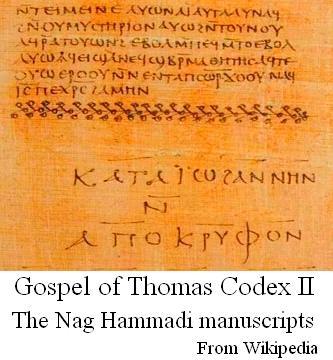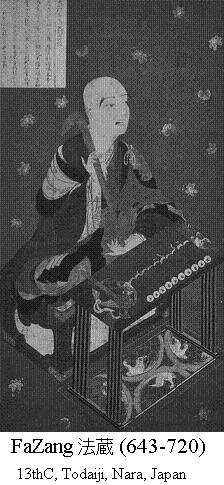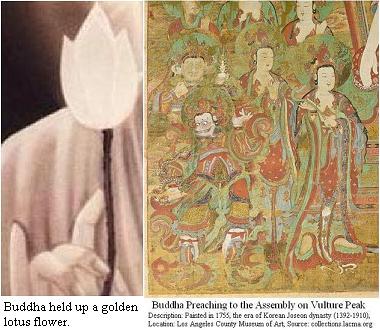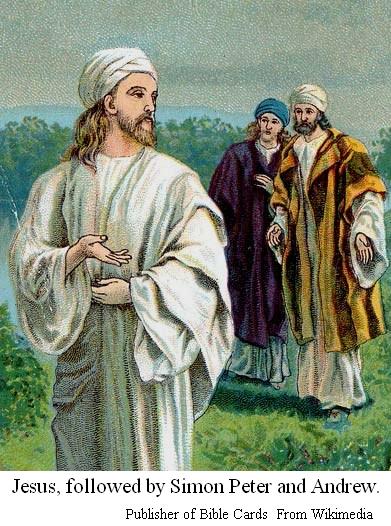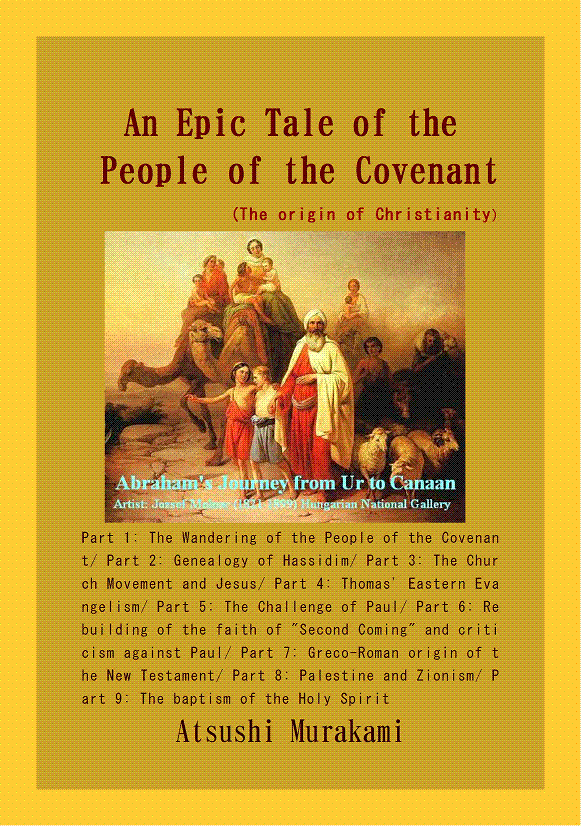These are the secret sayings that the living Jesus spoke and Didymos Judas Thomas recorded. (Thomas Preface)
And he said, "Whoever discovers the interpretation of these sayings will not taste death. Those who seek should not stop seeking until they find. When they find, they will be disturbed. When they are disturbed, they will marvel, and will reign over all. (Thomas 1-2)
--------------
The secret sayings
"The secret sayings" is the meaning behind the words that Jesus talked about in his life time. It can only be understood by men who are aware of truth (Gnosis). In the Zen Buddhism term, it could be said "The teaching only to be entrusted from Buddha to Buddha." Whoever discovers the interpretation of these sayings will be freed from suffering of the incessant round of birth and death and will finally reign the whole creation. Therefore those who seek should not stop seeking until they find and are disturbed and marvel. These teaching methods of Jesus seem to have been brought into the tradition of Zen Buddhism in China and Japan after having had been transmitted to India by Thomas.
When the tidal wave of church movement occurred among the gentile believers who used Greek as intermediate language in the Mediterranean coast, Mahayana Buddhism was flourishing in North India. In Chapter 2 Expedient Means of the Lotus Sutra, one of the main scriptures of Mahayana Buddhism, Buddha preaches to Sariputra, one of the ten great his disciples, as follows;
Shariputra, the truth existed as universality within individual events and things in this world, in other words, the real image, can only be understood and shared among Buddhas but not among ordinary men. Thus I have taught with expedient means to delight the hearts of the assembly. It is useless to explain to the ordinary. However, now I, joyful and fearless, in the midst of the bodhisattvas, honestly discarding expedient means, will preach only the unsurpassed Way. Even though, persons of dull capacity and small wisdom, who are attached to appearances, proud and overbearing, are incapable of believing in this Law. When the bodhisattvas hear this Law, they will be released from all entanglements of doubt. The twelve hundred Arhats, they too will all attain Buddhahood.
Samatha vipasyana
Now, how can we understand the secret sayings? Jesus tells us just only to look at things in front of us. All we need is perseverance, for what is hidden from us now will be definitely exposed to us.
Jesus said, "Recognize what is in your sight, and that which is hidden from you will become plain to you. For there is nothing hidden which will not become manifest." (Thomas 5)
This phrase of Jesus' preaching is reminiscent of the philosophy of Hua-yen (華厳哲学) taught by FaZang(法蔵644-712), saying "Li (理universality = absolute reality) does not exist without Shi (事particularity = appearance), for what is absolute reality is ever manifested in appearance."
Japanese Zen Master Dogen Zenji (道元禅師1200-1253) says in his Scripture Fukan-zazengi (普勧坐禅儀The Way of Zazen Recommended to Everyone), "Originally, the Way (truth) is complete and universal. But if you use your wisdom and try to understand it, you will lose your mind in confusion. Therefore learn to withdraw, turning the light inwards, illuminating the Self." He might be telling us that if we run after the truth using our own wisdom, it will not be possible for us to reach. If, on the other hand, we cease to use our minds at all (止samatha), and see things as they really are (観vipasyana), there is nothing hidden and the truth will be just beneath our feet.
There are preached three kinds of Samatha vipasyana (止観contemplation), that is, JianCi-ZhiGuan(漸次止観:the method of gradual attainment of the ultimate enlightenment), BuDing-ZhiGuan(不定止観:indeterminate meditation) and YuanDun ZhiGuan(円頓止観:perfect and sudden cessation and contemplation), in "Great Concentration and Insight (摩訶止観)," written by Tiantai Zhiyi (天台智顗538-597), who was active during Wei, Jin, and Southern and Northern Dynasties and Sui Dynasty period of China, and is counted as one of four patriarchs, Nagarjuna (龍樹150?-250?), Hui-wen (慧文550-577), Hui-si (慧思515-577), Zhiyi - of Tiantai School of Buddhism (天台宗).
Wall-gazing
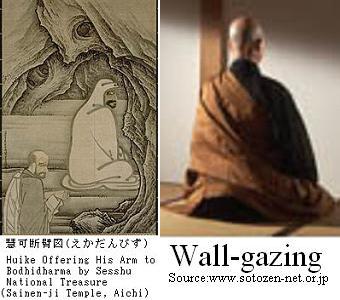
Bodhidharma(菩提達磨), who is said to have left South India, come to the Shaolin temple on Mount Song in Henan Province and faced a wall for nine years to transmit the Mind Seal of Zen Buddhism to China during the era of Wei, Jin, and Southern and Northern Dynasties period (220-589 CE) of China, described in his book 'The Treatise on the Two Entrances and Four Practices (二入四行論),' saying; "There are many ways of entering into enlightenment, but all of them may effectively be subsumed under two categories: the 'entrance of principle (理入)' and the 'entrance of practice (行入).' The entrance of principle is to become enlightened to the Truth on the basis of the teaching. The same True Nature is possessed of all sentient beings, both ordinary and enlightened. However, this True Nature is covered up by false sense impressions. If one discards the false and resides frozen in 'wall contemplation,' in which self and other, ordinary person and sage, are one and the same, he will be thus mysteriously identified with the True Principle and attain serene and inactive. This is called the entrance of principle.
Kodo Sawaki (澤木興道), who was a Japanese Soto Zen (日本曹洞宗) teacher being active in the Showa era (昭和:Emperor of Showa era 1901-1989), also is said to have taught as follows: Zen can change the transmigration, the endless circle of birth and death, into Buddhahood, It is the way for a single leap's entry to Buddhahood. Zen is not Dharma (law and order) of the three realms of existence (past, present and future existence = this world) but of Buddhahood. The Buddha Dharma is only entrusted from Buddha to Buddha, but not to ordinary man. Because it was realized by Shakyamuni all by Himself, He said that each Buddha on His own, together with all Buddhas, has been directly able to fully realize It. Therefore when Buddha and Buddha sit straight and interact each other, then it is realized.
Buddha had a secret saying; Kasyapa didn't conceal it.
Once in ancient times, clouds were gathering at Mount Grdhrakuta (Current Bihar State located northeast of India) to listen to the preaching of Buddha. However he did not speak a word and just held up a golden lotus flower, twirled it, and showed it to the assemblage. At this, they all remained silent. Only his best pupil Kashyapa broke into a smile. Buddha said: "I have the fundamental truth which could not be expressed in words and letters. Now I entrust Mahakashyapa with this."
Time passed to the later period of the Tang (唐) dynasty under the reign of Emperor Zhaozong (昭宗888-904). One day, Cheng-Shangshu(成尚書:成is a family name, 尚書is a job category of high-level civil servant), who was serving as the prime minister of the Tang dynasty at that time, visited Zen maste YunJu-DaoYing(雲居道膺:830-902) who was living in the Zhenrusi(真如寺) Temple of Mount Yunju (雲居山), which locates in the northwest of Yongzhou prefecture (永州県) of Jiujiang (九江) city Jiangxi Province (江西省), together with a general.
Around this time, although the Huang Chao Rebellion (黄巣之乱) finally subsided, its imperial capital Changan (長安) was reduced to ashes and local ruling clans struggled with each other seeking to expand their influence nationwide. Thus the Great Tang Empire now was in an extremely precarious position. Regarding Cheng-Shangshu, when he was young, he was a member of the bandits for a while for he had killed a man after drunk. He performed distinguished war services as a subordinate of Jingnan(荊南)-Jiedushi(節度使:regional military governor) Chenru(陳儒), He inherited the position of Jingnan-Jiedushi later and finally promoted to Zhongshuling(中書令:Prime Minister). So he was a prominent self-made man, However, he was defeated by General Li Shenfu(李神福), who was Yang Xingmi (楊行密), the King of Wu(呉王)'s great commander, and threw himself into the Yangtze River at the end.
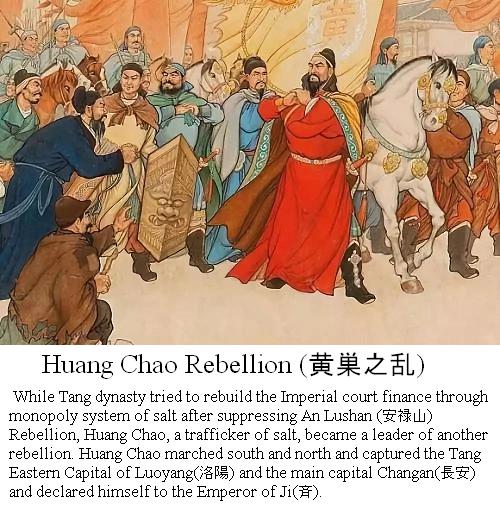
On the other hand, Zen Master DaoYing, who had won the high honor of 'Great man of Southern Chan Buddhism(南宗偉人)' assumed the chief priest of Zhenrusi Temple in the year 883 AD, the 3rd year of Emperor Xizong (僖宗)'s Zhonhe (中和) era, following the invitation of Jiedushi Nanpingwang (南平王) Zhongchuan (鐘伝). Afterwards the fame of Zhenrusi Temple resounded throughout the country and received an oblong frame written as '龍昌禅院 (Zen meditation hall flourished like a dragon)' from Emperor Xizon.
Now, let's go back to the incident of Cheng-Shangshu's visiting Zen Master DaoYing. When Cheng met DaoYing, he asked first "I have heard that 'Buddha had a secret saying; Kasyapa didn't conceal it.' What is Buddha's secret saying?" DaoYing Shouted "Cheng-Shangshu." Cheng responded "Oh." DaoYing asked "Understand?" Cheng said "No." Then DaoYing explained, "If you don't understand, then what you don't understand is Buddha's secret saying. If you understand, then what you understand is what Kasyapa didn't conceal."
This koan recorded in Book Chanlinleiju (禅林類聚) ends here. However, about 200 years later, Xuedou Zhijian(雪竇智鑑1105-1192), a famous Zen Master of Southern Song Dynasty(南宋), made the following gatha (poem) for this koan; 世尊有密语 (Buddha had a secret saying),迦叶不覆藏 (Kasyapa didn't conceal it)。一夜落花雨 (The rain scattered flowers overnight),满城流水香(The scent of the flowers spread throughout the town with the flow of the water).
Nickname
When Andrew, one of the two who had first become disciples of Jesus, introduced his elder brother to him, Jesus said, "You are Simon son of John. You will be called Cephas (which, when translated, is Peter)." (John 1:42) It seems that Jesus called his disciples by this kind of nickname.
According to Mr. Sasagu Arai (荒井献), author of the Japanese version of 'The Gospel of Thomas,' both Didymus and Thomas mean twin in Greek and in Aramaic respectively. Thus Thomas is honored as the twin of Jesus by authors of 'The Acts of Thomas' and 'The Book of Thomas the Contender.' However, it is uncertain whether this disciple with the secular name of Judas was called Thomas in Aramaic or Didymos in Greek by Jesus. Incidentally, in the Rinzai sect of Zen Buddhism(臨済宗), a student is given a dogo (道号pseudonym) by a Zen Master after his passing one or two koans (subject which Zen-masters give each religious to learn and practice the doctrine of Buddhism) and the relationship of teacher and pupil between the Zen master and that student is established. These customs of Zen Buddhism may have been derived from the earliest group of Jesus' followers.
Interestingly, quite a few disciples among the Twelve Apostles seem to have not had their nicknames. The disciples, who had been called by their nicknames, would have had a kind of teacher-and-pupil-relationship with Jesus in his life time. In other words, the Apostles who did not have nicknames may have been added into The Twelve during the process of the formation of the Gospels after Jesus' death.
<To be continued>
《Chanlinleiju (禅林類聚)》
Cheng-Shangshu(成尚書) visited Zen maste DaoYing(道膺) who was living in the Zhenrusi(真如寺) Temple of Mount Yunju (雲居山) together with a general.
When Cheng met DaoYing, he asked first "I have heard that 'Buddha had a secret saying; Kasyapa didn't conceal it.' What is Buddha's secret saying?"
DaoYing Shouted "Cheng-Shangshu."
Cheng responded "Oh."
DaoYing asked "Understand?"
Cheng said "No."
Then DaoYing explained, "If you don't understand, then what you don't understand is Buddha's secret saying. If you understand, then what you understand is what Kasyapa didn't conceal."
《Wudeng Huì yuan (五灯会元)》Fourteenth Volume
世尊有密语 (Buddha had a secret saying),
迦叶不覆藏 (Kasyapa didn't conceal it),
一夜落花雨 (The rain scattered flowers overnight),
满城流水香(The scent of the flowers spread throughout the town with the flow of the water).
What is "Baptism with The Holy Spirit"?
According to the dialectic of the Gospel of John,
【Thesis】"A man can possess eternal life through accepting testimony of the Son of man and being baptized by him." (John 5:24)
【Anti-thesis】But "The one who comes from the earth cannot accept the testimony by one from heaven." (John 3:32)
How then can a man possess eternal life?
【Synthesis】"If you want to be baptized with the Holy Spirit, you can just go back to the word which was with God in the beginning (John 1:1) and certify that God is truthful. (John 3:33)"
When he said, "You are Huichao," Zen Master Fayan thrusted vivid Self in Huichao in front of his eyes.
Purchase here
○One world:
Your Comments / Unsubscribe
SEAnews Twitter
SEAnews Messenger
SEAnewsFacebook
SEAnewsGoogle
SEAnews eBookstore
SEAnews eBookstore(GoogleJ)
SEAnews world circulation
